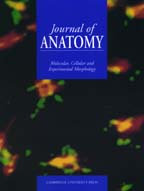Article contents
Immunohistochemistry of a prostate membrane specific protein during development and maturation of the human prostate
Published online by Cambridge University Press: 01 April 1997
Abstract
An antiserum against secretory vesicles from human seminal fluid (prostasomes) was used to study the localisation and distribution of the respective antigen(s) during prenatal development and pubertal maturation of the human prostate. The crude antiserum stained both secretory and membrane proteins in the adult prostate and other glands, such as pancreas and parotid gland. An immunoaffinity purified fraction from the antiserum selectively reacted with the apical plasma membrane of prostatic epithelium adluminal cells, recognizing a 100 kDa antigen (PMS). Even in the earliest stages of embryonic prostate specimens studied, the adluminal plasma membrane of the epithelial cells from developing glandular anlagen reacted strongly. The occurrence of PMS immunoreactivity in prostatic anlagen was directly correlated with lumen formation. As the antigen is an androgen-independently synthesised membrane protein of the prostate, it may possibly be used as a marker of cell polarity in the normal and pathologically altered prostate.
- Type
- Research Article
- Information
- Copyright
- © Anatomical Society of Great Britain and Ireland 1997
- 7
- Cited by


